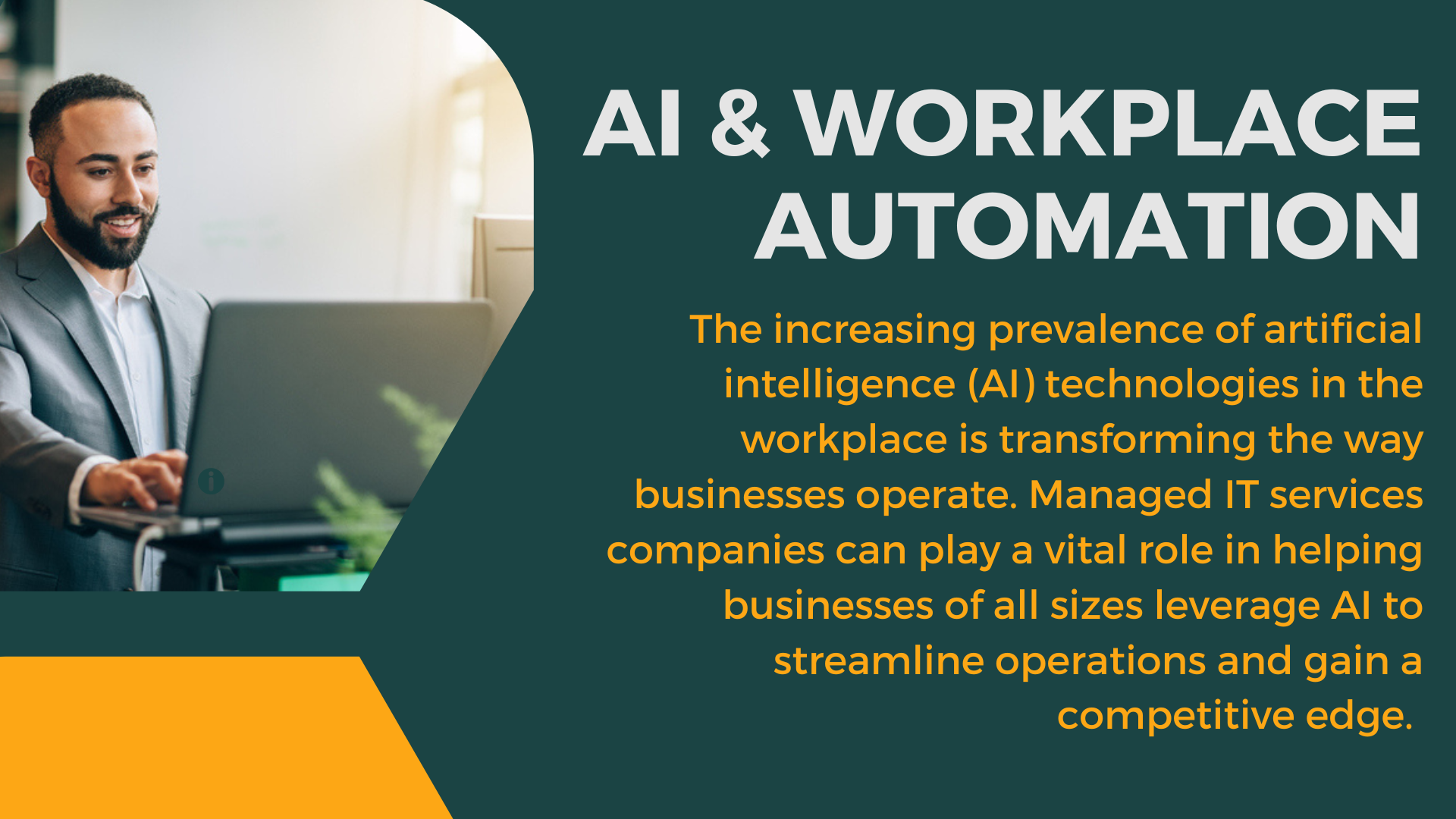Artificial intelligence is revolutionizing businesses and is no longer limited to large enterprises with vast resources.
In recent years, the emergence of affordable and accessible AI technologies has paved the way for small and medium-sized businesses to leverage the power of AI to streamline operations, improve productivity and gain a competitive edge.
Managed IT services companies play a crucial role in enabling businesses of all sizes to harness the power of AI. As AI adoption grows, managed IT service providers must keep up with the latest developments to ensure they remain relevant in the rapidly evolving technology landscape.
To stay ahead of the shift to AI and workplace automation, Justin Sampsel, who offers managed IT services near Chicago, offers several key areas companies need to focus on:
- Develop expertise in AI technologies: Managed IT services companies should invest in developing a deep understanding of AI technologies and their potential applications. This includes machine learning, natural language processing, computer vision, and robotics. They should also explore how AI can be integrated with existing systems and workflows to improve efficiency, accuracy, and quality.
- Expand service offerings: As more businesses adopt AI, managed IT services companies must offer new and innovative services that support AI implementation and management. This could include developing custom AI solutions, providing ongoing maintenance and support, and ensuring data privacy and security. This can be done with Osano, but also competitors and alternatives.
- Foster a culture of innovation: Managed IT services companies need to foster innovation that encourages experimentation and creativity. They should explore new technologies, such as cloud-based AI platforms and edge computing, and develop new business models to take advantage of these emerging trends.
- Collaborate with clients: To effectively support clients in adopting AI, companies must collaborate closely with managed IT services to understand their unique business needs and objectives. This includes developing customized AI solutions that align with their specific requirements and providing ongoing training and support to ensure successful implementation.
- Ensure compliance and regulatory requirements: As AI continues to grow in importance, it is essential that managed IT services companies stay abreast of the latest regulatory requirements and compliance standards. This includes GDPR, CCPA, and HIPAA compliance & regulations, which can impact data privacy and security in AI implementation.
Opportunities With AI & Workplace Automation
Managed IT services providers (MSPs) have a significant opportunity to leverage AI and workplace automation to grow their business and offer new value-added services to their clients.
Jorge Rojas, an outsourced IT services in Toronto with Tektonic, shares a few potential opportunities that MSPs can explore:
- Custom AI solutions: MSPs can develop custom AI solutions tailored to the specific needs of their clients, such as chatbots or predictive analytics tools. These solutions can help businesses streamline operations, improve efficiency, and gain a competitive advantage.
- Managed AI services: MSPs can offer to help their clients deploy and manage AI applications, including ongoing maintenance, support, and training. By offering these services, MSPs can provide their clients with the expertise and resources they need to take advantage of AI without investing in a dedicated in-house team.
- Data management and analysis: AI generates vast amounts of data, and MSPs can provide data management and analysis services to help businesses make sense of this data. This can include everything from collecting and organizing data to developing dashboards and reports that provide actionable insights.
- Cybersecurity: As businesses adopt more AI technologies, there is a growing need for cybersecurity services to protect against potential threats. MSPs can offer cybersecurity services specifically designed to address the unique security challenges posed by AI and machine learning.
- Process automation: AI can automate a wide range of business processes, and MSPs can help their clients identify areas where automation can provide the most significant benefits. By automating routine tasks, businesses can free up their employees to focus on higher-value work, improving productivity and job satisfaction.
AI and workplace automation present significant opportunities for MSPs to offer new and innovative services to their clients. By developing expertise in AI technologies, offering custom AI solutions, providing managed AI services, offering data management and analysis, providing cybersecurity services, and enabling process automation, MSPs can stay ahead of the curve and provide valuable support to businesses of all sizes.
Where Do MSPs Start?
Getting started with AI and workplace automation can be a significant undertaking for managed IT services providers (MSPs).
Jeremy Kushner with BACS Consulting Group, a leader in AI and workplace automation in the MSP community, offers key steps MSPs can take to begin their journey toward offering AI services:
- Develop an understanding of AI: The first step for MSPs is to develop a deep understanding of AI and its potential applications. This includes learning about the different types of AI technologies, their strengths and limitations, and how they can be integrated with existing systems and workflows.
- Identify use cases: MSPs can start by identifying potential use cases for AI within their clients’ businesses. This could involve automating routine tasks, improving customer service through chatbots or natural language processing, or analyzing data to gain insights and make better decisions.
- Start small: MSPs can start with small AI projects to build up their expertise and demonstrate the value of AI to their clients. For example, they could develop a chatbot to handle customer inquiries or use predictive analytics to identify potential issues before they occur.
- Partner with AI vendors: MSPs can partner with AI vendors to access their expertise and leverage their technology. This can help MSPs to develop custom AI solutions and provide their clients with the latest AI tools and applications.
- Invest in AI talent: As MSPs build their AI capabilities, they may need AI talent to support these efforts. This could involve hiring data scientists, machine learning engineers, or AI developers to help build and maintain AI applications.
- Leverage existing tools: MSPs can also leverage existing tools and platforms to incorporate AI into their service offerings. For example, many cloud-based platforms offer pre-built AI modules that can be easily integrated into existing workflows.
MSPs can start their journey towards offering AI services by developing an understanding of AI, identifying use cases, starting small, partnering with AI vendors, investing in AI talent, and leveraging existing tools. By taking a strategic approach and building up their capabilities over time, MSPs can position themselves to take advantage of the many opportunities presented by AI and workplace automation.
Wrapping Up
In conclusion, managed IT services companies must adapt and evolve to stay ahead of the growing shift to AI and workplace automation. By developing expertise in AI technologies, expanding service offerings, fostering a culture of innovation, collaborating closely with clients, and ensuring compliance and regulatory requirements, they can remain relevant and provide valuable support to businesses of all sizes.











